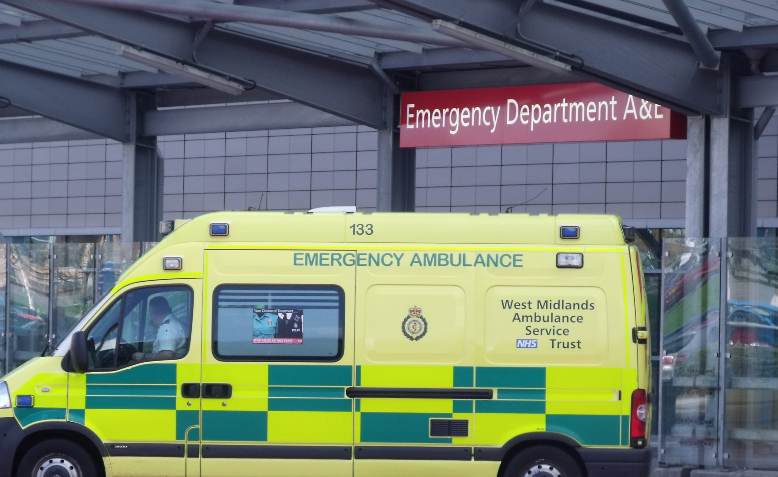 Ambulance outside hospital. Photo: Elliott Brown / Flickr / cropped from original / CC BY 2.0, license linked at bottom of article
Ambulance outside hospital. Photo: Elliott Brown / Flickr / cropped from original / CC BY 2.0, license linked at bottom of article
Severe staff shortages and people dying in ambulances outside hospitals is the state the Tories have put the NHS in, writes Terina Hine
October was a record-breaking month for the NHS, and not in a good way. The health service is unravelling, and is about to face the most difficult winter in its history.
NHS Providers have issued a stark warning about the state of hospitals, ambulance services and mental health provision in England. Almost 90% of hospital trust leaders report feeling “extremely concerned” about the winter; up from 56% last year.
Demand for treatment has shot up. There’s a huge backlog of cases and staff are physically and mentally exhausted. Covid is still an issue – the latest ONS figures reported 995 Covid-related deaths in UK for the week ending 5 November – the largest number since March.
In October hospital waiting lists jumped by 100,000 – that’s in one month alone – the last twelve months saw waiting lists climb by a million, and over 12,500 people have been waiting for treatment for more than two years. Even lifesaving scans are postponed and delayed: the British Heart Foundation are reporting that twenty times more people are waiting over 6 weeks for heart scans than before the pandemic.
October also saw the highest number of 999 calls ever recorded in a single month. The ambulance service is collapsing under the strain. Waits of more than 12 hours for a paramedic are not uncommon – that’s twice as long as at the height of the pandemic – with life threatening consequences.
And these waits are followed by long periods parked outside A&E departments. Over 160,000 patients a year have come to harm as they wait outside hospitals – some die before they make it inside. According to a damning report by the Association of Ambulance Chief Executives, such problems occurred “on a daily basis” in October, for “some hospitals, every day is a ‘bad day’”.
One anonymous ambulance driver wrote in the Guardian that he recently worked 54 hours in four days, had five hours of unplanned overruns at the end of shifts, and was frequently eight-nine hours into a shift before being able to take a break. The physical strain of such overwork is unsustainable.
Chris Hopson, Chief Executive of NHS Providers told BBC Radio 4’s Today programme that because the NHS has “insufficient capacity, we can’t keep up . . . [and] this is before we get into peak winter, which is usually January.” Flu has yet to bite.
The government’s £5.9bn NHS budget increase, promised this Autumn, will have little impact on the impending crisis. The urgent issue is staffing: 90% of NHS trusts are concerned about burnout, unsurprising given the pandemic. More nurses and midwives are reported to be leaving the profession than at any time since 2017.
But it’s not just nurses – there are 93,000 staff vacancies currently recorded across the sector. In the UK 48% of consultant posts remained unfilled last year – in 2013 the figure was 36%. Hence we have one of the lowest number of doctors per head in Europe. And in social care we have over 100,000 vacancies in England alone, made worse by an additional 32,000 staff who remained unvaccinated and lost their jobs on 11 November.
In a desperate bid to prevent a Christmas exodus there are now calls for a “retention bonus” in social care; without a functioning care system, hospitals will be unable to discharge patients and the pressure on the NHS will be unprecedented.
The NHS is in a critical state, yet the Health Secretary choses this moment to announce a mandatory Covid vaccination policy for NHS staff from April 2022. The policy, opposed by all the main professional bodies and trade unions, including The Royal College of Nursing, the BMA, the Royal College of GPs, GMB, UNITE and UNISON, could see the staffing crisis get a whole lot worse.
The vast majority of NHS staff are fully vaccinated – the latest data shows 93% have had one, and 90% two, vaccines – but the new policy is likely to cause vaccine hesitant staff to leave the service and see the already straining NHS placed under intolerable pressure, damaging patient care. A better vaccine policy would be one based on targeted education rather than compulsion.
After a decade of the deepest and most severe cuts the NHS has ever seen, and an 18-month pandemic, the government has rewarded NHS staff with little more than applause. Instead, it handed out contracts to private healthcare providers, often friends of Tory MPs, privatising the NHS by stealth. Underfunded and understaffed, the NHS winter crisis has arrived early.
Join Revolution! May Day weekender in London
The world is changing fast. From tariffs and trade wars to the continuing genocide in Gaza to Starmer’s austerity 2.0.
Revolution! on Saturday 3 – Sunday 4 May brings together leading activists and authors to discuss the key questions of the moment and chart a strategy for the left.

